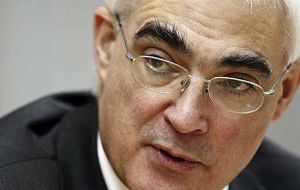MercoPress. South Atlantic News Agency
British Chancellor tells bankers “the party is over”
 No Darling for bankers and the “almighty car crash”
No Darling for bankers and the “almighty car crash” Britain’s Chancellor of the Exchequer Alistair Darling has warned bankers that the party is over and they must realise the world has changed. He made the comments in a BBC interview before leaving for the G20 summit in Pittsburgh.
He wants a limit on bonuses, and rules to allow banks to get them back if bankers make losses later. But he said there was a limit to how much could be achieved by regulation, and bankers needed to realise that they had to change their behaviour.
He wants to use regulations to force banks to limit the proportion of their profits that they can give out in bonuses and make sure there are no rewards for failure.
The UK's financial regulator, the Financial Services Authority (FSA), is preparing to put such regulations in place.
“The key thing to get across to bankers is that, for them, the party has got to be over,” he said. “We've got to get into a situation where they behave sensibly.
”After all, there are very few bankers in the world who would still be standing if it hadn't been for the fact that taxpayers all over the world had to step in and save them last year.“
He said he agreed with the thrust of a speech by Lord Turner, the head of the FSA, who said on Tuesday that ”radical change“ was needed in the regulation of the banks that had ”cooked up“ the crisis.
”What's the origin of this crisis? It's frankly that banks started buying and selling products that they didn't understand,“ Mr Darling said.
”It's hardly surprising then that there's this almighty car crash. The tragedy is that it wasn't them [the bankers] that suffered, it was everybody else because the world economy plunged into a recession.“
The chancellor has also unveiled a new policy that he wants to introduce at the meeting in Pittsburgh with a view to having it agreed at the G20 finance ministers' summit in November. At the summit in London, it was agreed there would be a blacklist of countries that were operating as tax havens.
Mr Darling's idea is to also have a blacklist of countries that are regulatory havens where the rules and regulations companies have to follow are less onerous.
”People can set up in the Caribbean or South America, the regulators here can't get the sort of information they want and that sort of secrecy leads to instability,“ he said.
”I think we can get an agreement this weekend to outlaw that sort of activity.”
The rules he wants to introduce would allow sanctions to be taken against countries that do not have strong enough regulatory regimes.
The other part of the plan would be that there could be sanctions taken against UK-based companies that did business in blacklisted countries.
So, for example, if a British bank invested in an investment fund based in a blacklisted country, the regulator could penalise it by saying it had to keep more of its cash in reserve.




Top Comments
Disclaimer & comment rulesCommenting for this story is now closed.
If you have a Facebook account, become a fan and comment on our Facebook Page!